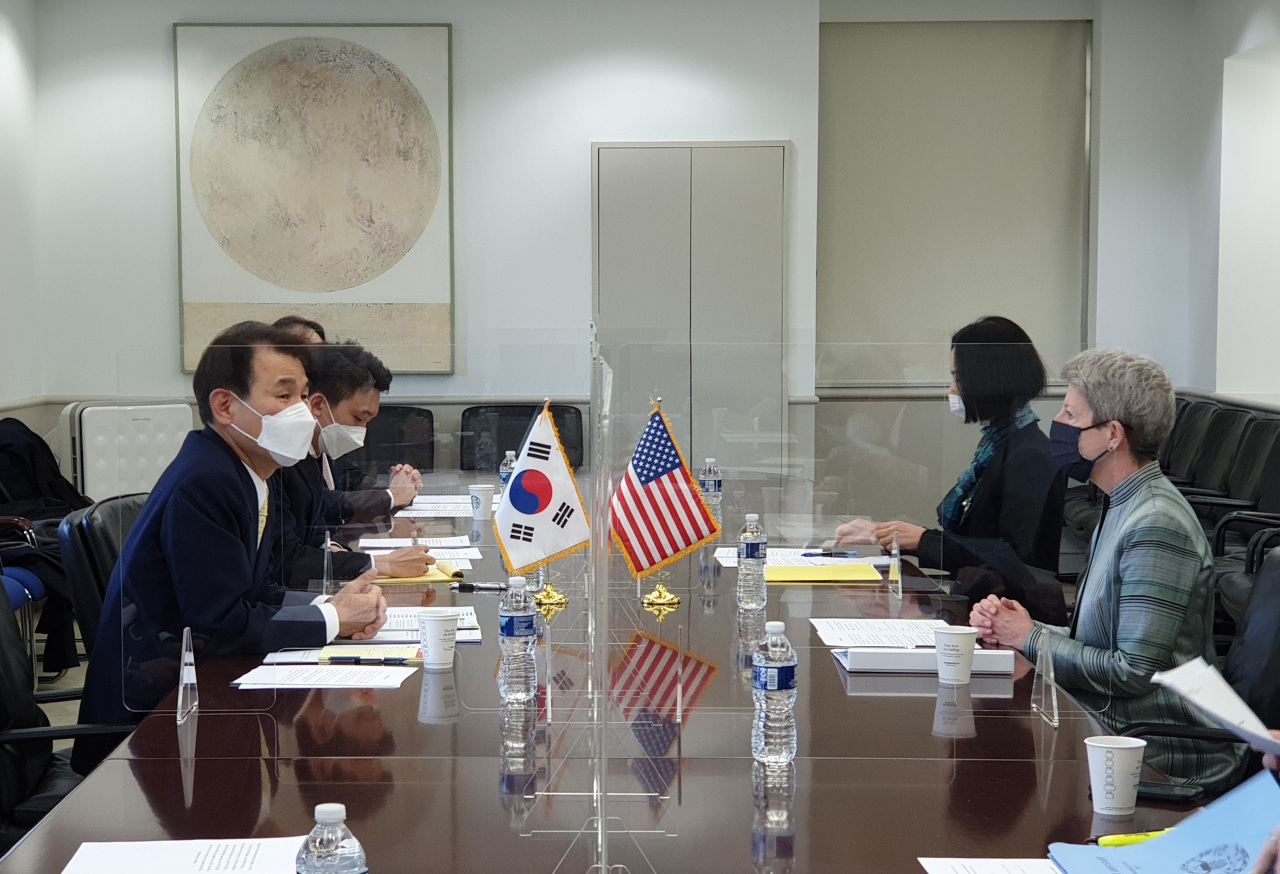Seoul’s contribution to US troop costs rises 13.9%
By Ahn Sung-miPublished : March 10, 2021 - 19:00

South Korea has agreed to pay 13.9 percent more in its contribution to host American troops here for 2021, the Foreign Ministry announced Wednesday.
Under the new six-year accord, Seoul will pay 1.183 trillion won ($1.04 billion) this year for the upkeep of the 28,500-strong US Forces Korea. The 13.9 percent hike from the previous 2019 deal represents the biggest annual rise for Seoul in nearly two decades.
The six-year agreement is effective until 2025, and also covers last year when both sides failed to come to a deal. The two governments decided to freeze the 2020 payment at the 2019 level of 1.04 trillion won.
The deal was clinched during the talks in Washington from March 5-7, on renewing the Special Measures Agreement, the pact that governs the upkeep of US Forces Korea, led by Jeong Eun-bo, Seoul’s chief negotiator, and his US counterpart, Donna Welton.
Despite a significant rate increase, Seoul expressed relief at finally sealing the deal after more than a year of impasse in negotiations and an absence of an agreement. The previous one-year pact’s deadline expired at the end of 2019.
“The agreement resolved a vacuum of a deal that had lasted about a year and three months,” the ministry said in a statement. “It served as an opportunity for the two countries to reaffirm the importance of the solid South Korea-US alliance as the linchpin for peace and prosperity on the Korean Peninsula and in Northeast Asia and the need for stable stationing of the USFK.”
From 2022 to 2025, the amount will be determined in accordance with the rate of annual increase in Seoul’s defense budget, the ministry said. This means in 2022, Seoul’s rate will rise by 5.4 percent -- this year’s increase in defense budget -- and shoulder around 1.24 trillion won.
Based on the Defense Ministry’s forecast of a 6.1 percent on-year increase in defense spending, Seoul could shoulder around 1.5 trillion won in 2025.
The new calculation of using Korea’s defense budget as an indicator for the cost-sharing scheme raises concern that the rate could exceed exponentially in the future. During the Obama administration, the two countries used the inflation rate to come up with the corresponding hike that is capped at 4 percent.
But the officials stressed that it is a reasonable standard that reflects Seoul’s financial capacity.
“The defense budget rate reflects our financial capability and defense power, and it’s a measure determined through parliamentary deliberations,” Jeong said, stressing the new deal was struck at a “reasonable and “equitable” level. “It is a trustworthy and reasonable standard that any citizens can verify.”
This year’s rate of 13.9 percent is calculated based on last year’s 7.4 percent increase in Seoul’s defense spending, and a 6.5 percent rise in the cost for Korean employees in the USFK.
Jeong also emphasized that the latest deal is focused on creating a stable employment environment for the Korean workers of the USFK, in order to prevent employees from going on unpaid leave for months like last year due to the absence of the funding arrangement.
To prevent such furlough in the future, the agreement stipulated a rule for the first time in the SMA that authorizes Seoul to provide wages to the Korean workers at a same level set in the previous year.
The agreement now awaits several steps before it can be concluded, including a tentative signing, a review by the Ministry of Government Legislation, approval from a Cabinet meeting and then by President Moon Jae-in before the two countries officially can close the deal. Finally, the National Assembly here has to ratify the SMA as the last step, while the US does not require congressional approval.
The signing of the new SMA could happen during US Secretary of State Antony Blinken and Defense Secretary Lloyd Austin’s visit to South Korea, which will reportedly take place next week.
There have been eleven SMA talks since 1991, when Seoul started shouldering partial cost of the US forces, including wages for Korean workers at the base, construction of military installations and logistical support.
The settling on the cost and terms have always been tough, with the talks at times becoming a source of contention between the two allies.
A major setback came during the Trump administration when the former president, under the “America First” slogan, insisted that US allies are not paying enough of the cost for US troops on their soil, and accused allies of being “free riders.”
Last year, the two sides were close to signing a new deal when Seoul offered a 13 percent hike from the previous 2019 accord, when it paid 1.04 trillion won, but Trump turned down the offer and reportedly demanded a 50 percent increase.
The defense cost agreement is a sign of reinvigorated ties between Washington and Seoul. It is also part of US President Joe Biden’s alliance-centric policy of improving relationships with traditional allies to tackle various challenges, including a nuclear-armed North Korea and to keep an assertive China in check.
By Ahn Sung-mi (sahn@heraldcorp.com)









![[Hello India] Hyundai Motor vows to boost 'clean mobility' in India](http://res.heraldm.com/phpwas/restmb_idxmake.php?idx=644&simg=/content/image/2024/04/25/20240425050672_0.jpg&u=)










